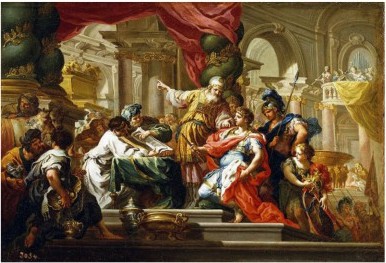0332 Alexander the Great conquers Persia. On Alexander’s death in 323, his general Seleucus takes the Fertile Crescent, and Ptolemy takes Egypt. Similarities between Jesus and Alexander: divine adoption, dual divine- human parentage, virgin birth, universal transformative mission, death at 33, deification. Conquest of the Holy Land by yet another foreign power in spite of the piety of the state (barring foreign wives and foreign gods), leads to a rejection of the Deuteronomist view and the emergence of Messianic Apocalypticism in the prophet Daniel.

Alexander in the Temple of Jerusalem
Alexander brings a flood of new settlers into the area, creating a new political-social reality - Hellenism: Greek becomes the lingua franca; a new scientific, literary and legal environment emerges; the personal philosophy of Stoicism helps individuals to cope with a confused social reality; religious syncretism becomes the basis of the dominant common culture among the upper classes of these regions until Islam in the 7th century CE. Universalism (peaceful coexistence) is the new standard, but is emphatically rejected by Yahwistic Jews, who are portrayed by the civilized world as misanthropic and inhumane. Jews’ refusal to worship the Emperor, and their habit of sending money to Jerusalem mark them for suspicion as a fifth column.
0301 Ptolemy I of Egypt takes Jerusalem (Yehud Medinata) by attacking on the Sabbath.

Maccabees oppose Antiochus IV
0300 Traditionalists vs. Hellenizers: A prolonged internal struggle begins, manifest early in disputes over the calendar. The common core of Judaism is determined: God as an active element in history, the Torah, support for the Temple, establishment of synagogues, dietary laws, circumcision, the Sabbath, exclusive Yahwism.
~~~~~~~~



